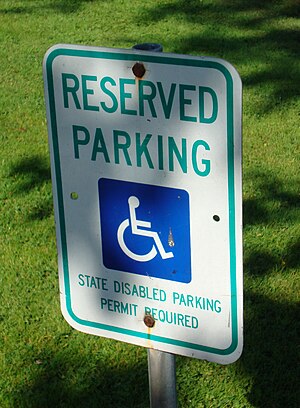As I matured into a young adult and gained more self-confidence, I would sometimes confront people who used a handicapped space but looked healthy, even if they had a permit. I was wrong to do that.
When I was diagnosed with MS I became aware that many people have invisible disabilities. Maybe they walk perfectly well for the first 100 yards, then their legs tire. Maybe after a short time they need to stop and let their heart or lungs catch up. Maybe they deserve their handicapped parking space, even if I’m not aware of what their disability is. Frankly, it's none of my damn business.
Yet, this remains a bitter pill to swallow, because I still believe that 90% of the healthy-looking people I see using handicapped parking spaces, permit or none, are actually cheats. Because I don't have enough information to accuse any particular person, however, I must give everyone the benefit of the doubt.
Of course, if someone in a handicapped space doesn't have a permit at all, then they are fair game. I recently learned of an iPhone app where you can report cheaters. Here’s a similar app that also works on Android and Blackberry phones.
But cheaters aren't the only problem in the handicapped parking world. Engineers and drafters routinely screw things up too. When they design parking lots and streets, they don't always follow regulations, and even if they do, they don't always use common sense.
One design problem that I often encounter is that the access strip, the yellow striped area where I unload from my wheelchair van, is not wide enough. Skinny access strips are just a token attempt at making the handicapped parking space truly accessible.
There is a related misuse of these access strips. Often, when all the handicapped spaces are taken, some idiot will decide that a nice wide access strip beside my van is actually an extra parking space for them. The first few times I encountered situations like this, I would scramble for a scrap of paper and a pen so I could leave a note explaining the way the world works to these morons.
So I decided to just draft a form letter, which I keep about 10 copies of in my glove box. In this letter, I try to strike a balance between explaining the infraction to otherwise well-intentioned dimwits (or possibly just old folks who don’t think clearly anymore and should no longer be driving), versus ripping a new one for people who understood what they were doing but just didn't care. Here's what I came up with:
Van handicapped spaces are laid out so that a person like me, who uses a wheelchair van, can load and unload beside the van. By illegally parking in the space reserved for loading and unloading, you made it impossible for me to get back into my van. These access strips are denoted by striped lines on the pavement, right under your car. I guess you also didn’t notice the big sticker on my side door asking you not to park within 8 feet of me.
Maybe my son or wife was with me today, in which case they had to get into the van and pull it back a few feet before opening the door and extending the ramp for me. However, I do drive with hand controls (I don't anymore, but that's none of their business), and maybe this time I was by myself. If so, I had to ask a perfect stranger to back the van out a few feet for me so that I could open the side door, extend the ramp, and drive into my van. If you are disabled yourself then you know that there are enough challenges associated with being handicapped already. We don’t need to be making life more difficult for one another. If you’re not disabled, then you’ll just have to try to imagine my frustration with you.
Please don’t park illegally in this manner again.
Sincerely,
Mitch
















